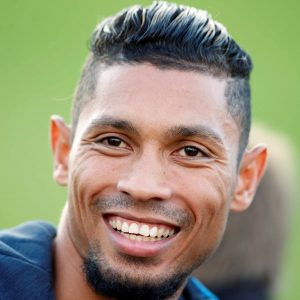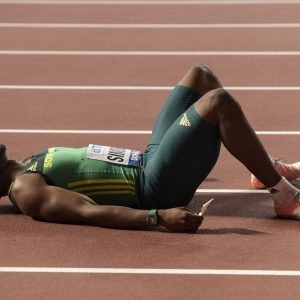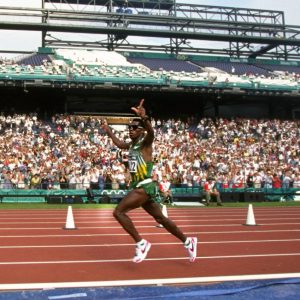Khotso Mokoena’s unforgettable Beijing moment
The man who returned with South Africa’s only medal in Beijing wants to go out with a bang in Tokyo, and has already started preparing for life after athletics.
Author:
26 September 2020

Khotso Mokoena calls himself “Croc”. It is a fitting name. His surname, in SeSotho, derives from “crocodile”. On 18 August 2008, he embodied this nickname, transformed into the deadly reptile and stalked his prey: an Olympic medal in the long jump category. His failure to achieve the stringent 8.15m distance set by the Olympic Committee in the semifinals nearly shattered his dream, but his 8.14m leap was well placed inside the top 12 best distances to earn him a spot in the finals.
Mokoena had a secret turnaround strategy to produce the necessary performance in the final after stuttering in the semis. He would simply trust his training. His fourth jump of 8.24m meant only Panama’s Irving Saladino, with a leap of 8.34m, managed to better his effort.
He pocketed the elusive Olympic silver medal and that August day remains one of the finest in South African athletics folklore. The former World Junior triple jump champion still gets goosebumps when he thinks about that glorious moment. To this day, he still regards the accomplishment as one of the best moments of his career, and it has spanned over 20 years.
“It is a feeling you can’t explain to anyone,” said an animated Mokoena. “The first person that called me was DJ Fresh [when he was still 5FM’s Drive Time host] to put me on air and congratulated me for the incredible work I did. You know how it’s like, you train for your whole life just for one special night. Sometimes it takes you eight, 10 or 12 years in order to win an Olympic medal. It’s something I won’t forget even today. That victory still opens many doors for me.
Related article:
“And heading to the finals I qualified as second last person and most people had already thrown the towel on me. But I knew how my training and preparations went so I was hopeful that the podium finish was possible. All that effort I invested building up to the Games was too good to go to waste so I had a point to prove. That’s the positive mindset I had throughout.”
Beijing’s triumph, made in Athens
The multiple national champion began preparing to win that medal right after the 2004 Olympics in Athens. “I was the youngest member of the South African squad as I was 19 years,” said Mokoena, a Sports Management graduate from North West University, Potchefstroom.
“All my competitors were my role models. Some of them were in their 30s and have been in the sport for years. I’m talking about athletes above 28 and most were seniors and, for me, that was the learning curve and wonderful experience.
“After the 2004 Olympics, I needed to taste a victory based on what I witnessed in Athens. I told myself I need this in my life. Then I started to put more effort into my training and from there I began to work even harder. Then I aimed for a medal which I achieved four years later.”
Mokoena was born in 1985 in the semi-urban settlement of Ratanda, a tiny township south of Heidelberg. His father Phakiso and mother Sonto supported the family by selling soft drinks in their backyard. Throughout his childhood, Mokoena devoted his life to sport, taking part in every sporting code besides football. That was until Elna de Beer, his teacher at Nigel High School, told him to focus on the long and triple jump.
“I am what I am today because of my parents,” said Mokoena. “If you are from the township, you must be so hungry to succeed. It’s not a good place for anyone to be in and that prepares you to be strong in life. I think my parents should take credit for my achievements. Firstly, for allowing me to participate in the sport, which is not easy.
Related article:
“I come from a lower-class family and parents did what they had to do to put food on the table. My parents had entrepreneurial skills. I always applaud my parents for not holding me back but they supported and guided me all the way. As I participated in gymnastics at school, they used to set up the bars for us to leap over them and I used to master that with ease. I think that’s where Elna realised I got potential and made me switch to long and triple jump completely. Then I started to work with her till my first Olympics in 2004.”
In 2009, Mokoena was at the apex of his career. “I personally think 2009 was the big year for me rather than 2008, not too sure people understand that I broke the national record that year and set up the African record,” said Mokoena. “I also won a silver medal at the Berlin World Championship games. That silver meant I have collected all medals on offer from national, continental, and the world. I was on form that time and if you think about it, then 2008 was the first peak and 2009 was the second peak. That year made me start getting more recognition and that made me push for even more success.”
Preparing for life after athletics
Now, at 35, the 2014 Commonwealth games triple jump gold medalist is edging closer to retirement and has already been preparing for life after sport. He runs a logistics company called YDG Express. Mokoena inherited his parents’ knack for entrepreneurship and invested the R500 000 bonus he got from the South African Sports Confederation and Olympic Committee (Sascoc) into the property business. His biggest wish is to compete in next year’s Games in Tokyo before bowing out of the sport.
Related article:
“I decided to invest in self-education and learn more about business. I started doing a property management course to learn more about property investment,” said Mokoena.
“So, the reason I went to business was to prove a point that I’m more than just a sportsperson. Not to disappear in the process and die broke too. Athletics is lonely so it is business. So, I’m used to that. I hope this shall inspire more athletes to invest in the future. I know as athletes we like to keep it to ourselves. But no one makes good decisions from the word go, as I started into the property business but I had numerous challenges and I was forced to close it down.
“Then I opened a cafe in 2011 which I pretty did very well with until I sold it in 2014 to focus on 2014 Commonwealth games. Today, I’m into logistics and business is doing well. And my biggest wish is to compete in next year’s Olympics before making an official retirement.”



